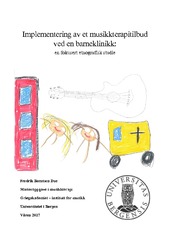| dc.contributor.author | Due, Fredrik Berntsen | |
| dc.date.accessioned | 2017-08-01T06:44:43Z | |
| dc.date.available | 2017-08-01T06:44:43Z | |
| dc.date.issued | 2017-06-15 | |
| dc.date.submitted | 2017-06-14T22:00:13Z | |
| dc.identifier.uri | https://hdl.handle.net/1956/16157 | |
| dc.description.abstract | Sammendrag av artikkel: Musikkterapien i Norge er et voksende fagfelt, hvor det stadig opprettes nye musikkterapistillinger i både helserelaterte fagfelt og pedagogiske kontekster. Musikkterapi ved pediatriske sykehus, er spesielt et fagområde som kan oppleve en videre vekst. Nye musikkterapistillinger ved pediatriske sykehus blir utviklet på ulike måter, og en studie av disse implementeringsprosessene kan være verdifull. I denne studien brukte jeg en fokusert etnografisk tilnærming for å utforske hvordan ansatte i det tverrfaglige teamet opplevde implementeringen av musikkterapi ved en barneklinikk. I tillegg arbeidet jeg også ut ifra tre arbeidsspørsmål: (1) hva har musikkterapeuten gjort for å få innpass i et allerede dannet hierarki; (2) hva har annet helsefaglig personell/ledelsen gjort for/mot denne nye profesjonen; og (3) hvilke elementer har hjulpet eller hindret implementeringen? Datainnsamling og analyse består av refleksjoner og analyser over feltobservasjoner med korresponderende feltnotater, samt semi-strukturerte intervjuer med ansatte fra det tverrfaglige teamet. Min musikkterapeutiske praksisperiode ved en pediatrisk medisinsk avdeling har i tillegg gitt meg erfaringer som har påvirket resultatet. Resultatet viser at det var nokså enkelt å starte opp en musikkterapeutisk praksis ved barneklinikken, men at det var mer komplisert å fullt integrere musikkterapi i det tverrfaglige teamet, både formelt og uformelt. | en_US |
| dc.description.abstract | Abstract of critical commentary ("kappe"): This is a critical commentary ("kappe") on the article "Implementation of music therapy at a Norwegian children’s hospital: a focused ethnographic study". The aim of this critical commentary is to contextualize the research, elaborate on theoretical foundation and methods used in the research article, and give critical reflections on the choices I have made throughout the research process. In the introduction, I describe the research's relevance in relation to current music therapy research, and contextualize my research within the paediatric context. This section ends with my motivation for conducting this study, and presentation of my research questions. In the next section I elaborate on the theoretical foundation, organizational theory, as well as music therapy as a profession and implementation research. A thorough elaboration is then given about the methods that I used, both in the field work and with the process of analysing my data. I end this critical commentary with a section consisting of ethical aspects and critical reflections on two of the main findings from the research. Overall in this thesis, the results suggest that when given administrative support, it was rather straightforward to start up a music therapy offer at this particular children’s hospital, but harder to fully implement the offer within the interdisciplinary team. The field of music therapy in Norway continues to develop, along with awareness of the need for music therapy. It is hoped that the Norwegian government will play a key role in supporting music therapy's further development and implementation in various contexts. Abstract of article: The profession of music therapy is experiencing a period of expansion in Norway, with the establishment of new positions occurring in a variety of health and educational contexts. One area that is poised for continued growth is music therapy within medical contexts, and in paediatric hospitals, in particular. There are various ways in which new music therapy positions are developed within paediatric hospitals, and studying these implementation processes can provide valuable insight. In this study, I used a focused ethnographic approach to explore how different members of the interdisciplinary team experienced the implementation of music therapy in a children’s hospital. I also addressed three secondary research questions: (1) what has the music therapist done to fit in the established hierarchy; (2) what have other healthcare personnel and the leadership done for/against this new profession; and, (3) what elements have helped or hindered the implementation? Data collection and analysis consisted of reflecting upon and analysing my participation in music therapy praxis on a paediatric medical unit, field observations within a children's hospital and corresponding field notes, and semi-structured interviews with interdisciplinary staff. Results showed that it was rather straightforward to start up a music therapy practice within this particular children's hospital, but it was more complicated to formally and informally fully integrate music therapy in the interdisciplinary team. | en_US |
| dc.language.iso | nob | eng |
| dc.publisher | The University of Bergen | eng |
| dc.subject | musikkterapi | eng |
| dc.subject | organizational theory | eng |
| dc.subject | organisasjonsteori Music therapy | eng |
| dc.subject | focused ethnography | eng |
| dc.subject | fokusert etnografi | eng |
| dc.subject | implementation | eng |
| dc.subject | implementering | eng |
| dc.title | Implementering av et musikkterapitilbud ved en barneklinikk: en fokusert etnografisk studie | eng |
| dc.title.alternative | Implementation of music therapy at a Norwegian children’s hospital: a focused ethnographic study | eng |
| dc.type | Master thesis | |
| dc.date.updated | 2017-06-14T22:00:13Z | |
| dc.rights.holder | Copyright the Author. All rights reserved | eng |
| dc.description.degree | Masteroppgave i musikkterapi | |
| dc.description.localcode | MAHF-INMUT | |
| dc.description.localcode | MUTP350 | |
| dc.subject.nus | 715136 | eng |
| fs.subjectcode | MUTP350 | |
| fs.unitcode | 18-30-00 | |
